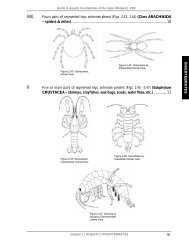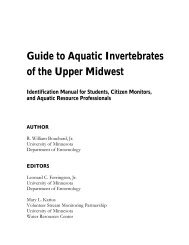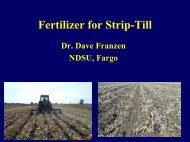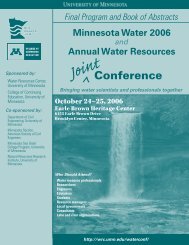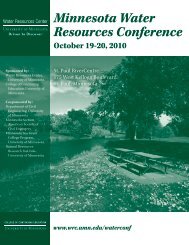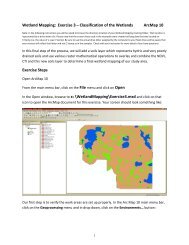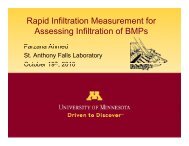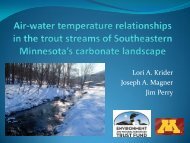Minnesota Water Resources Conference - Water Resources Center ...
Minnesota Water Resources Conference - Water Resources Center ...
Minnesota Water Resources Conference - Water Resources Center ...
Create successful ePaper yourself
Turn your PDF publications into a flip-book with our unique Google optimized e-Paper software.
BOOK OF ABSTRACTS<br />
Tuesday, Monday, October 27 23<br />
Poster Session 4:45–5:45<br />
Ditched Stream Restoration: Painter Creek, Minnetrista<br />
Tom Miller, Emmons & Olivier <strong>Resources</strong>, Inc., tmiller@eorinc.com; Renae Clark, Minnehaha Creek <strong>Water</strong>shed District<br />
A stream restoration project was implemented in March of 2008 on Painter Creek in an effort to improve water<br />
quality in Jennings’s Bay, Lake Minnetonka. This restoration project was implemented after the wetland was<br />
identified as having a high phosphorus sorption potential. The main project components include:<br />
■■<br />
■■<br />
■■<br />
■■<br />
■■<br />
■■<br />
creation of 2,500 LF of natural stream channel within a 58-acre ditched wetland,<br />
weir modification,<br />
sheet pile weir construction,<br />
bypass channel filling,<br />
native seeding and plantings,<br />
and reed canary grass management.<br />
The new channel was seeded and planted in spring of 2008 and will be allowed one full year to establish before<br />
it is brought on-line. This presentation will highlight aspects of the design and construction, focusing on<br />
successes and lessons learned.<br />
Developing Aquatic Life Benchmarks for Pesticides<br />
Phil Monson, <strong>Minnesota</strong> Pollution Control Agency, phil.monson@state.mn.us; Joe Zachman, <strong>Minnesota</strong> Department of<br />
Agriculture; Angela Preimesberger, <strong>Minnesota</strong> Pollution Control Agency<br />
Gathering and assessing toxicological research data is essential for developing decision-making tools to<br />
assess the quality of <strong>Minnesota</strong> waters. This project examined the utility of pesticide aquatic life benchmarks<br />
developed using a range of data primarily from public agency, pesticide registrant, and open literature sources.<br />
Methods used in this effort were assessed for their effectiveness to develop benchmarks using limited data sets.<br />
Toxicological data for pesticides was assessed for quality assurance and examined for defensible outcomes by<br />
comparing benchmarks developed from the selected data sources. Data gaps, method refinements and policy<br />
considerations will be discussed.<br />
47 <strong>Minnesota</strong> <strong>Water</strong> <strong>Resources</strong> <strong>Conference</strong>, October 27–28, 2008



